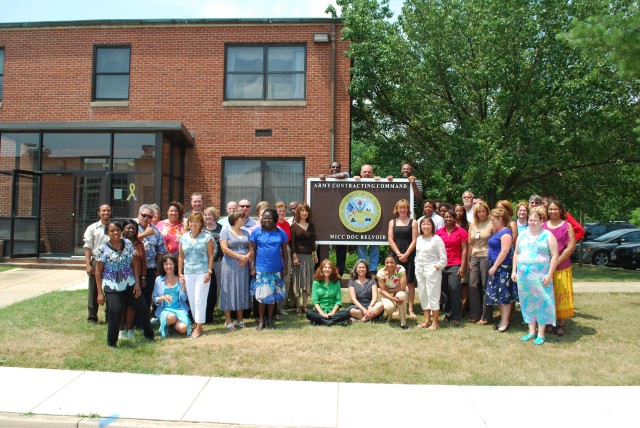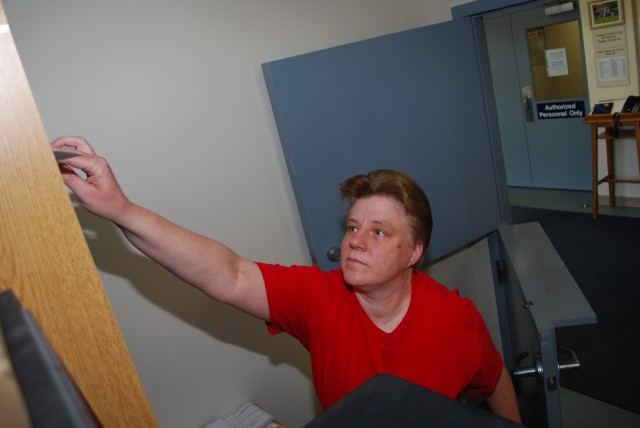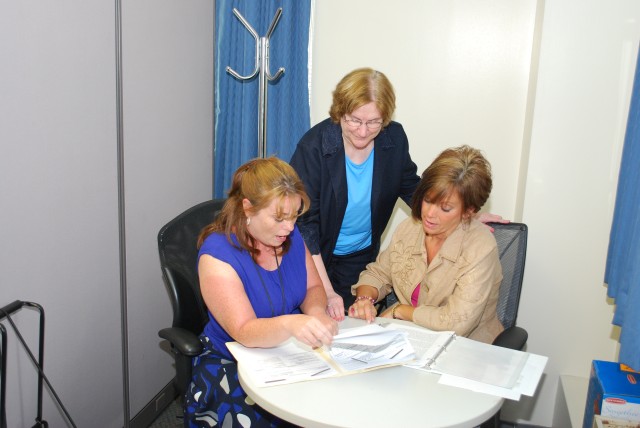Processing an average of more than 3,000 contracts valued at more than $300 million annually, the Fort Belvoir Directorate of Contracting is the hub for contracting activity at Fort Belvoir (Va.), Fort A.P. Hill (Va.), and other local military facilities.
"I think our office provides the best service to our customers. We have a very good working relationship with our customers and continue to work on good communication," said Christine Thompson, director of contracting, Mission and Installation Contracting Command, Fort Belvoir DOC. "The DOC staff works very diligently to educate the customer on the contracting process while still meeting their mission (requirements). Educating the customer will always be an on-going process because our customers turn over staff as quickly as we do and areas of emphasis change in acquisition."
The Fort Belvoir DOC supports the Fort Belvoir and Fort A.P. Hill garrison commanders, tenant units on the installations, Walter Reed Army Medical Center (non-medical contract support), Army Research Lab, Adelphi, Md., and Rivanna Station, Va.
The Fort Belvoir DOC has three divisions supporting contracting actions. One division supports all pre-award actions, one division supports the garrison's post award requirements and construction projects to include all recovery act projects for the installations; and one division supports post award requirements for the other activities, such as Defense Acquisition University, WRAMC and others. The DOC also has a small information technology division that maintains and supports contracting software, a legal staff, a small business staff, and an operations and policy division made up of a procurement analyst, the Government Purchase Card Team and an administrative officer.
"The biggest challenge facing all the contracting offices is the shortage of trained and seasoned contracting professionals. We are all dealing with an aging workforce that can retire today or in the next few years," Thompson said. "The new folks are mostly coming from the intern program. The Army has the best intern program of all the federal agencies but its difficult to retain them as we are competing with other agencies offering higher grades and a lesser workload, especially in the National Capital Region."
Thompson places a lot of emphasis on team building, banking on it to create an environment that employees will not want to leave.
Each month the DOC hosts a gathering for employees to get together as a team. The meetings vary from formal training to addressing various relevant contract issues. Thompson said the training ensures the DOC staff is familiar with the standardized policies and procedures of the MICC.
Team building at the Fort Belvoir DOC is not all work and no play. Each quarter a division hosts a social event such as a St. Patrick's Day party, Valentine's Day party, etc.
"The events have almost become a competition amongst the divisions seeing who can host the best party," Thompson said. "There are games, great food and great company."
As in all contracting offices, the second half of the fiscal year is their busiest.
"The third and fourth quarters are usually the busiest time of year for contracting offices, obligating funds that expire at end of the fiscal year," Thompson said. "The past couple of years, many of the activities and the garrison have been incrementally funding service type requirements. So we are now modifying contracts every month rather than once a year but the fourth quarter is still very busy.
"The Recovery Act Stimulus Projects added additional workload as well as additional oversight in the reporting on all projects quarterly through the president's initiative on government transparency. The contracting staff and contractors must report accurately and timely on all projects involving the stimulus funds." Thompson said.
"We have a professional and positive workforce that is here to support our Soldiers, and take great pride in their profession as well as the service they provide to their customers," said Thompson, who is celebrating her fourth year at the DOC.
"I have seen a lot of changes at the Fort Belvoir DOC and all for the good. We have a good relationship amongst the divisions, which is critical as workload may need to be shifted as it increases either in pre-award or post award. This is a great team to be a part of," Thompson said.








Social Sharing